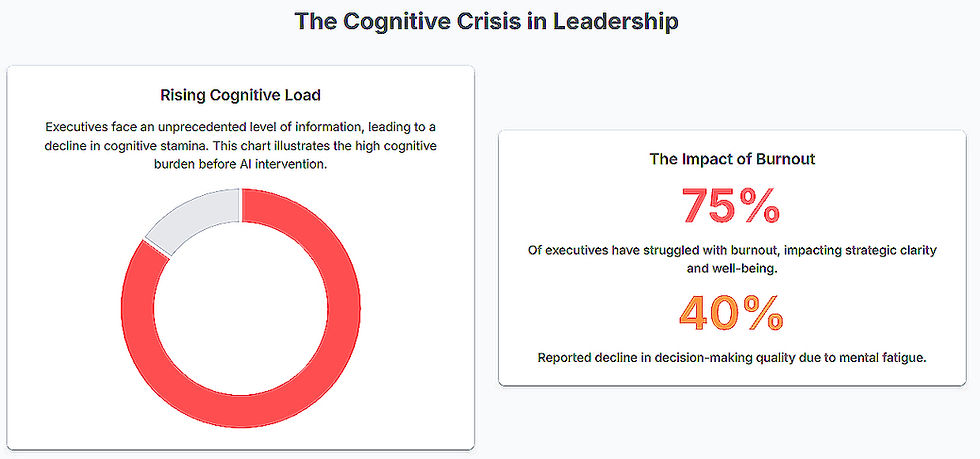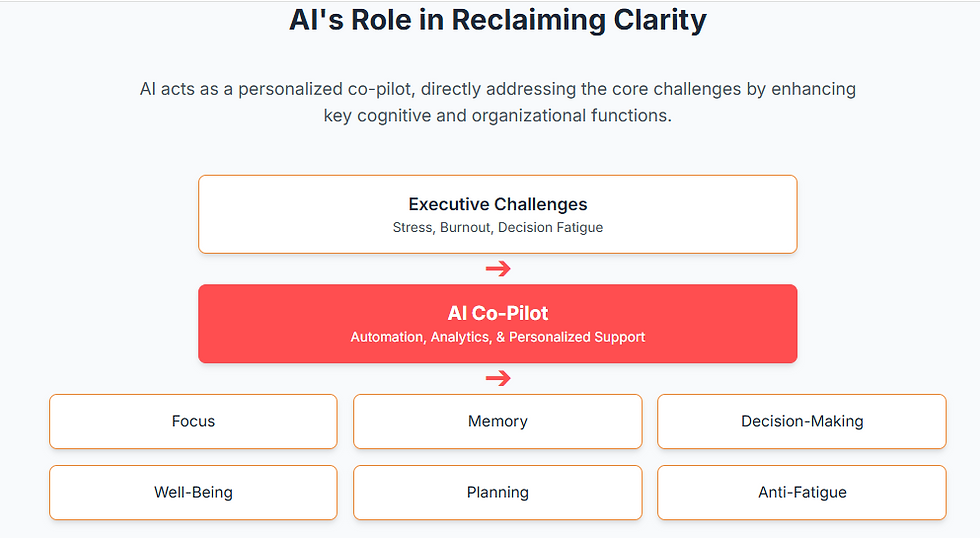AI as a Co-Pilot: Tackling Executive Burnout and Cognitive Fog
- David Priede, MIS, PhD

- Sep 6, 2025
- 5 min read
Updated: Sep 22, 2025

Nurturing Executive Cognitive Health, Leadership, and Organizational Success in the Modern Business Era.

With AI, executives now have access to a powerful ally: a personalized co-pilot that can sharpen focus, fortify memory, streamline decisions, and restore the clarity needed to lead. The future of leadership isn’t just about grit—it’s about intelligent support.
Takeaways
AI automates routine tasks, helping executives regain focus and combat cognitive overload.
Intelligent platforms provide decision support, reducing uncertainty and easing strategic planning for leaders.
Personalized digital wellness tools enhance resilience, proactively monitoring stress and promoting well-being.
In my last article, "Reigniting the Executive Mind," I outlined a crisis facing modern leaders: a decline in cognitive stamina due to overwhelming stress, burnout, and decision fatigue. Artificial Intelligence offers a range of practical solutions that can act as a personalized co-pilot, helping executives reclaim their focus, energy, and strategic clarity.

AI can address many cognitive and organizational challenges faced by business executives, as described in the article, by enhancing focus, memory, decision-making, stress management, and efficiency.

Supporting Focus and Attention
Artificial Intelligence can help executives manage information overload by automatically filtering emails, scheduling meetings, and summarizing key points from lengthy documents, thus reducing distractions and enabling sustained concentration during critical tasks. Intelligent virtual assistants can manage notifications and surface only the most relevant information at the right time, mitigating digital interruptions.

Enhancing Memory and Recall
AI-powered tools such as smart calendars, meeting transcription software, and advanced search functionalities can help executives remember names, deadlines, and action items by organizing data and offering instant recall of past communications and documents. Smart reminders and pattern-recognition software can detect upcoming obligations and alert executives before deadlines are missed.

Improving Decision-Making
AI analytics platforms can process vast amounts of data, provide decision support through predictive modeling, and present actionable insights that reduce uncertainty for leaders. By surfacing patterns and trends that might be missed amidst "decision fatigue," AI can clarify choices and enable more informed strategic planning—even in the face of incomplete information.

Combating Mental Fatigue and Brain Fog
AI can automate repetitive administrative tasks, freeing executives to focus on creative and strategic work. Digital wellness platforms can track stress indicators and recommend breaks, mindfulness exercises, or workload adjustments based on real-time cognitive metrics. Some AI tools even use biometric or behavioral data to identify early signs of burnout and suggest interventions.

Streamlining Planning and Organization
AI project management platforms can assist by automating complex scheduling, prioritizing tasks based on deadlines and dependencies, and flagging key risks or missed milestones. Intelligent assistants can enhance cognitive flexibility by organizing timelines and suggesting optimal resource allocation for multiple projects simultaneously.

Facilitating Well-Being and Resilience
AI-driven platforms can deliver personalized cognitive training, mindfulness routines, and self-care interventions tailored to executive needs. By analyzing behavioral data, mood trends, and productivity metrics, these platforms can offer proactive support and destigmatize seeking help, helping leaders balance their professional and personal lives.

Examples of AI Tools in Action
AI-Powered Wearables & Health Monitors: Devices like the Oura Ring or Whoop tracker use AI to analyze physiological data (Heart Rate Variability, sleep quality, body temperature). The AI provides a daily "readiness" score, offering concrete data on recovery levels. It can suggest taking a lighter day, prioritizing rest, or engaging in guided breathing exercises when stress levels are detected to be high.
Intelligent Workload Management: AI assistants like Motion or Clockwise can automate calendar management. They go beyond simple scheduling by analyzing task priorities, energy levels, and deadlines to build an optimal daily plan. This reduces the mental load of planning and prevents the over-scheduling that leads to burnout.
Personalized Mindfulness Apps: Platforms like Calm or Headspace use AI to recommend specific guided meditations or mindfulness exercises based on a user's stated mood or tracked stress patterns, making mental wellness practices more targeted and effective.
AI Summarization Tools: Executives can use AI tools (ChatGPT, Gemini, Claude, Grok) to get instant, concise summaries instead of reading lengthy reports or email chains. This allows them to grasp key information quickly, saving significant mental energy and time.
Data-Driven Decision Support: For complex strategic choices, AI can analyze vast datasets, identify hidden patterns, and model potential outcomes. This provides leaders with data-backed insights, reducing the reliance on a fatigued mind and minimizing the risk of poor judgment.
AI Knowledge Management ("Second Brain"): Tools using AI, such as Notion AI or Mem, help capture, organize, and intelligently resurface information. An executive can ask a natural language question like, "What were the key takeaways from my Q3 client meetings?" and the AI will retrieve the relevant notes, acting as a reliable external memory.
Intelligent Distraction Blocking: AI-powered applications can learn an executive's work patterns and intelligently block distracting websites and notifications during scheduled "deep work" sessions, helping to train and maintain focus.
AI-Generated Focus Environments: Services like Brain.fm use AI to generate music and soundscapes scientifically designed to improve focus, helping to drown out distractions and promote a state of flow.
Strategic Planning Assistants: Quantive StrategyAI for end-to-end strategy execution, Cascade for linking high-level plans to daily operations, and ClearPoint Strategy for interpreting performance data and recommending actions.
In summary, AI can relieve cognitive burden, reduce stress, and cultivate executive agility through automation, predictive analytics, digital wellness, and personalized support, paving the way for more resilient and effective business leadership.
About Dr. David L. Priede, MIS, PhD
As a healthcare professional and neuroscientist at BioLife Health Research Center, I am committed to catalyzing progress and fostering innovation. With a multifaceted background encompassing experiences in science, technology, healthcare, and education, I’ve consistently sought to challenge conventional boundaries and pioneer transformative solutions that address pressing challenges in these interconnected fields. Follow me on Linkedin.
Founder and Director of Biolife Health Center and a member of the American Medical Association, National Association for Healthcare Quality, Society for Neuroscience, and the American Brain Foundation.





